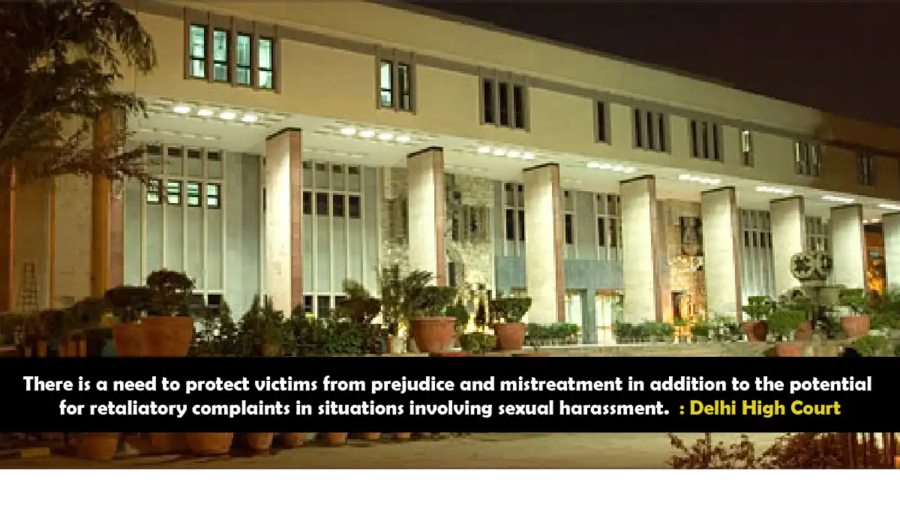Introduction
In this case, Dr. X is the target of two writ petitions filed by the same petitioner concerning claims of sexual harassment and the ensuing investigation procedures. The petitions contest the composition of the committees (IC) that looked into the claims and denials made by the petitioner and Dr. X, as well as the recommendation made by them.
Facts of the Case
After being transferred under Dr. X in 2001, the petitioner, an assistant professor of ophthalmology, claimed that she was subjected to ongoing sexual harassment by him. The harassment allegedly persisted in spite of formal complaints, which were filed with the Delhi Commission for Women, MHFW, and the Medical Superintendent, among others. In response, Dr.X charged the Petitioner with academic fraud and unethical behavior.
In order to look into the claims, several committees were established, including an experts committee and a fact-finding team. Citing breaches of the CCS Rules and Vishaka Guidelines, the petitioner objected to the formation of these committees. Her objections were ignored, and the investigations continued, producing reports that cast doubt on the Petitioner’s credibility and favored Dr. X
Petitioner’s Argument
The petitioner claimed that the committees looking into her complaints had been wrongly constituted and had not followed the guidelines set forth in Vishaka guidelines. She took issue with the lack of objectivity, incorrect documentation, and disregard for the larger picture of the harassment she experienced. Victimization was also emphasized in relation to the Petitioner’s transfer while Dr. X kept his job.
Respondent’s Argument
The MHFW and Dr. X were among the respondents who defended the committee’s conclusions and constitution. They maintained that the reports were based on unbiased investigations and evidence, and that the correct procedures had been followed. Dr. X asserted that the Petitioner’s complaints were driven by a personal grudge and refuted the accusations made against him.
Court’s Observation
The Court pointed out that the committees investigating the complaints were not properly constituted in line with the CCS Rules and the Vishaka Guidelines. The process contained irregularities, lacked objectivity, and disregarded the victim’s perspective. The Court acknowledged the need to protect victims from prejudice and mistreatment in addition to the potential for retaliatory complaints in situations involving sexual harassment.
The Court observed “The Committee also appears to have overlooked the numerous other instances cited by the Petitioner in her complaint which partake of sex-based harassment and discrimination. While sexual harassment would be a specie of sex-based discrimination, the latter could encompass a whole range of commissions and omissions, not restricted to acts that partake of express unacceptable sexual acts or innuendoes. CEDAW too recognizes that harassment can be “sex based’ and take various forms. The use of abusive and abrasive language and a certain imputation of the competence of a person only because such person is of a certain gender are matters that would be covered under the expression “sex based” discrimination. For instance, the specific case of the Petitioner is that the language used by Dr. X in the memos and letters issued by him, questioning the integrity and competence of the Petitioner, is plainly abusive. This has not been considered at all by the Committee. To borrow the articulation of the Supreme Court of Canada in Janzen, ―discrimination on the basis of sex may be defined as practices or attitudes which have the effect of limiting the conditions of employment of, or the employment opportunities available to, employees on the basis of a characteristic related to gender. It is important for committees dealing with complaints of sexual harassment to understand the above dimensions of sex-based discrimination at the workplace and not narrowly focus only on certain acts that may have been the trigger for a series of acts constituting sex-based harassment or discrimination.”
Court’s Decision
The Court quashed the reports of the committees and directed the MHFW to constitute new committees following the Vishaka Guidelines. The Petitioner was to be reinstated at her previous position, and Dr. X’s dual postings were to be reviewed. The Court allowed the Petitioner to seek damages for defamation through civil proceedings and ordered the respondents to pay costs to the Petitioner.
The Court’s decision emphasizes the importance of adhering to established guidelines and procedures in handling complaints of sexual harassment. It underscores the need for impartial investigations, protection of victims from victimization, and accountability for violations of rights.
 Cart is empty
Cart is empty 

